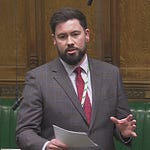Last night, I spoke about some of Ilkeston's heroes, Paul Robinson and Donald Rose, in a debate celebrating the 80th anniversary of Victory in Japan Day. I have included a recording of the speech above and the full speech here. As usual, I was limited for time in the debate, so I have included the original, uncut version of the speech below.
Thank you, Madam Deputy speaker. In February 1942, Singapore fell to the forces of the Japanese Empire. Nearly 85,000 British, Indian, Australian, and Malay soldiers were captured. One of those many thousands taken prisoner was Major Paul Robinson, a Sherwood Forester from Ilkeston. He was taken to join the hundreds of thousands of prisoners of war and civilians being forced to build the Burma-Thailand railway; across hundreds of miles of mountains and dense jungle, in some of the most brutal conditions imaginable. All the while, Major Robinson’s wife, Hope, waited at home without a single word from or about her husband.
More than two years later, in September 1944, 49 British prisoners of war were rescued by the Americans. Paul was, sadly, not among them, but two Foresters who knew him were. On their return to England, Hope sought these men out and interviewed them. The details were grim, but the men still believed that one day, the war would be over, that they would be free, and that fascism would be defeated. Hope reported what she had learned to the Ilkeston Miner’s Welfare and sent a letter to the Daily Express. What followed was extraordinary. In response, Hope received more than 5,000 letters from the families of soldiers far away, fellow distraught wives of prisoners of war, and those who just wished to express their sympathy and admiration.
More than 2,000 of these letters are now preserved at Erewash Museum in a permanent exhibit entitled “Letters of Hope”. For all his suffering, Paul returned to Ilkeston in September 1945, and he lived there until he died there in 1997, aged 87. Hope Robinson, herself, passed away in 2008, but thanks to her daughter Penny donating her letters in 2015, their memory and incredible story is remembered. In Erewash, we take that legacy very seriously. In the lead up to this speech and VJ Day itself, my office has been in touch with a number of families whose parents and grandparents experienced much the same as Paul and Hope. I’ve spoken to the leadership of Erewash Borough Council to see how we can better show our respect and admiration locally; and how we can live up to the solemn commitment we all make - that we will remember them.
Additionally, Madam deputy speaker, I would like to express my deep regret at the passing of another Ilkeston man, Donald Rose on the 11th July this year. At the age of 110, Donald was not just my most senior constituent, but for just over six months, he was our nation’s most senior citizen. Donald was a veteran of the Second World War, fighting all the way from 1939 to 1945. Donald fought fascists in the deserts of North Africa, and in the invasion of Sicily. He landed on the beaches of Normandy on D-Day and helped liberate France from Nazi tyranny. And if all that death and destruction were not enough, Donald saw with his own eyes the gravest evil of all, when he and his division entered the Bergen-Belsen concentration camp - met by 60,000 sick and starving prisoners, and the bodies of 13,000 murdered and unburied. Donald Rose was a hero, and I know I speak for every one of my constituents when I state that we will all miss him, and we will remember him.
As the final heroes of the Second World War fade away, it is more important than ever that these memories are preserved. It was the largest war in history, a horrible, but unquestionably noble struggle between good, and evil. In 1939, as the Nazis invaded Poland, they were met with brave but doomed cavalry charges. Less than six years later, Japan was forced to surrender as the United States wielded the ultimate, terrible power of modern science. 80 years on, we must remember all of these stories - the grandest deeds of courage and brilliance, the darkest acts of destruction and depravity, and the smallest expressions of love and hope. It has been an honour on this anniversary to share these stories with the House, and I hope that we will all continue to do so for many years to come.











Share this post